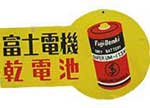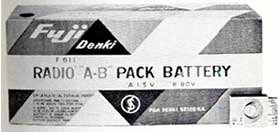Stories
Episode3. Our dry cell batteries have helped people to learn.
Episode3.
Our dry cell batteries have helped people to learn.

Did you know that Fuji Electric dry cell batteries were once exported in large numbers to the South American country of Colombia? Colombia is known today as a producer of coffee, but back in 1959, when rural farming areas were a few dozen kilometers away from village schools, only half of the country’s school-aged children were able to attend its about 1500 schools. It was facing serious problems with its educational environment. Lack of access to education meant that literacy rates among farmers were extremely low on the whole. Out of concern for this, one young pastor started a radio program to educate farmers.
However, the educational broadcasts he put so much work into couldn’t reach a village if it didn’t have electricity. So the decision was made to lend dry cell batteries and a radio to each household in the village. The batteries adopted were Fuji Electric's F611 large dry cell batteries. But in any case, when the batteries ran out, there were no shops where they could be replaced quickly. This meant there was demand for a product with the longest life possible, making F611 batteries perfect because they could last for 600 hours at least. When the decision was made to export, the contract was one of the largest ever for dry cell batteries in Japan.
"Now I can write whenever I want,” said one 48-year-old local woman. “This radio, the batteries, and my textbooks are like the missals at church. They’re the second most important things in my life."Radio broadcasting provided not only literacy education but also guidance on all aspects of life. Many boys and girls and adults would listen intently to the broadcast with textbooks and notebooks at hand, and the joy of learning and gaining knowledge spread to coffee farms across Colombia.

And the price of these dry cell batteries was actually paid with coffee. Colombia had a rule that, in principle, you could not import anything that could be made domestically. But still, the pastor was insistent on using Fuji Electric’s dry cell batteries. He offered to buy them if Japan would buy his coffee for the same price. So you can say that the dry cell battery business contributes not only to supporting education but also to the development of local industries.These days, we provide educational materials to countries such as Cambodia, Indonesia, and Vietnam, and we support the development of engineers through seminars and other efforts. We are also cooperating in the development of industries in emerging countries.
